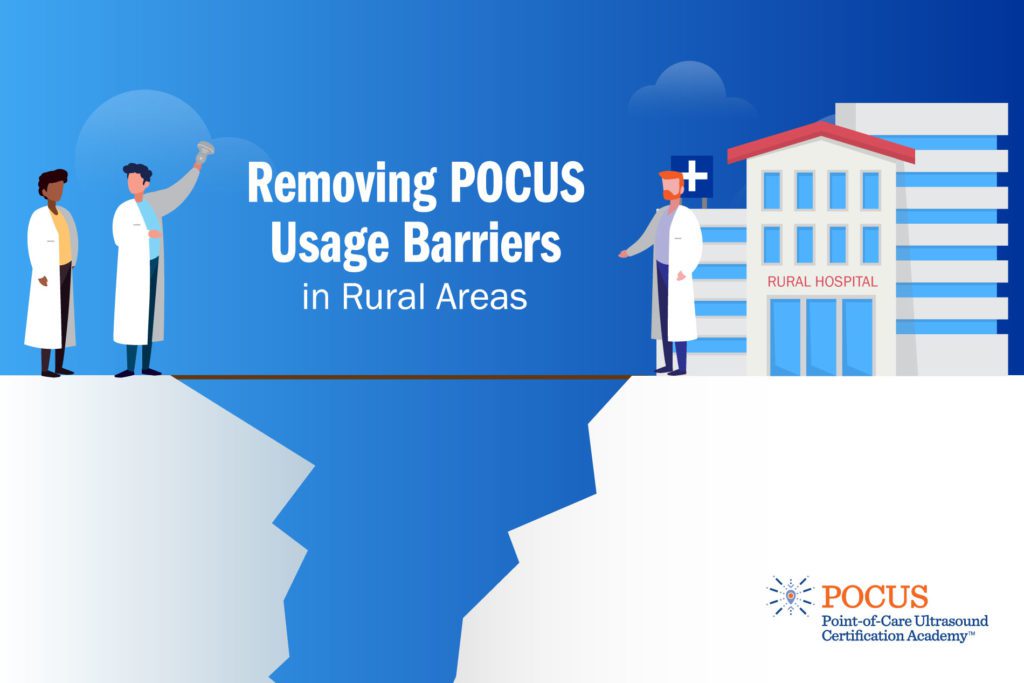According to the US Census Bureau, Sixty million people in the United States live in rural counties. This means that almost 20% of the US population receives rural healthcare. In the Journal of Emergency Medicine and Critical Care, Blaise Bellows, Jodie Totten, Sachita Shah, and Adeyinka Adedipe site that the four most significant barriers to the use of POCUS in rural areas are:
- Lack of training
- Shortage of support personnel
- Difficulty with image interpretation
- Liability concerns

Lack of Training
The reduced physician population and quality of medical care available in rural areas serve as significant barriers to POCUS use in rural communities and limit the number of trained professionals who can adequately provide ultrasound care.
The POCUS Certification AcademyTM has been developing POCUS25, a comprehensive curriculum that encompasses essential skills needed for POCUS use. One of the main goals of POCUS25 aims to help rural communities and developing countries overcome healthcare disparities. As it is imperative for healthcare providers to know, adhere to, and even engage in setting standards that improve and advance medicine to deliver care as specified and in the safest mode possible.
Shortage of Support Personnel
Having a support system is always important. While there is reduced availability of medical professionals in rural areas, they also lack enough support personnel trained to assist with POCUS care.
The Journal of Emergency Medicine and Critical Care survey was sent to medical providers in the WWAMI region, encompassing the states of Washington, Wyoming, Alaska, Montana, and Idaho. Of these providers, 80% of respondents said they would be interested in taking an emergency POCUS course if offered close to where they live, and 64% would participate in a distance learning program.
As POCUS25 is developed, online training and education will become available for the top procedures, allowing more individuals to become versed in proper POCUS practices.
Difficulty with Image Interpretation
Not only is the ability to carry out POCUS a crucial skill for healthcare practitioners, but correctly interpreting the results is equally important. It is essential to accurately look at the results of POCUS to obtain reliable information and diagnoses. Misinterpretation of what the image is depicting could lead to false analyses or the failure to diagnose all together!
However, image interpretation is also a hurdle to POCUS usage in rural locations due to the lack of comprehensive instruction, expertise, and knowledge of POCUS. This issue can be resolved with increased training programs and curriculum standards, such as those being set by the creation of POCUS25.
Concerns about Liability
In a field where split-second decisions can mean the difference between life and death, liability concerns are immense. When lives are at stake, a lack of proper action can harm individuals and lead to a life of lawsuits.
Regarding POCUS, liability concerns can be an obstacle to providers’ willingness to perform this form of care as medical professionals are concerned about adequately utilizing the modality. However, “a r. It Blaivas et al. found only one lawsuit filed against an emergency physician over a twenty-year period related to bedside ultrasound, and it was for failure to perform an ultrasound.”
Overcoming the Barriers
POCUS is the wave of the future, and it is essential to overcome the difficulties to use in rural areas. In an era where technology rules the world, training via online programs, webinars, and video conferencing could be a massive player in helping the rural medical community become POCUS savvy.
The new POCUS25 curriculum is also going to bring massive change to the global POCUS initiative. By providing a set of standards and guidelines for medical professionals using POCUS, care can be delivered safely. These limitations, just like any, can be overcome by hard work. The dedication of the POCUS Certification Academy and the zeal of the medical professionals working together to provide the best care possible for patients will change the future of medical care in rural and developing societies.
Be on the lookout for the completed POCUS25 list. Once the POCUS Certification Academy identifies the procedures necessary for clinical practice, the POCUS25 website will evolve into a training center. In the meantime, help shape the future of POCUS! Participate in the POCUS25 Survey to share your insights and POCUS best practices expertise.
Ready to get started on your POCUS journey? Check out our many certificates and certifications here.
Looking for additional inspiration? Sign up for our POCUS Post™ newsletter to receive monthly tips and ideas.





















